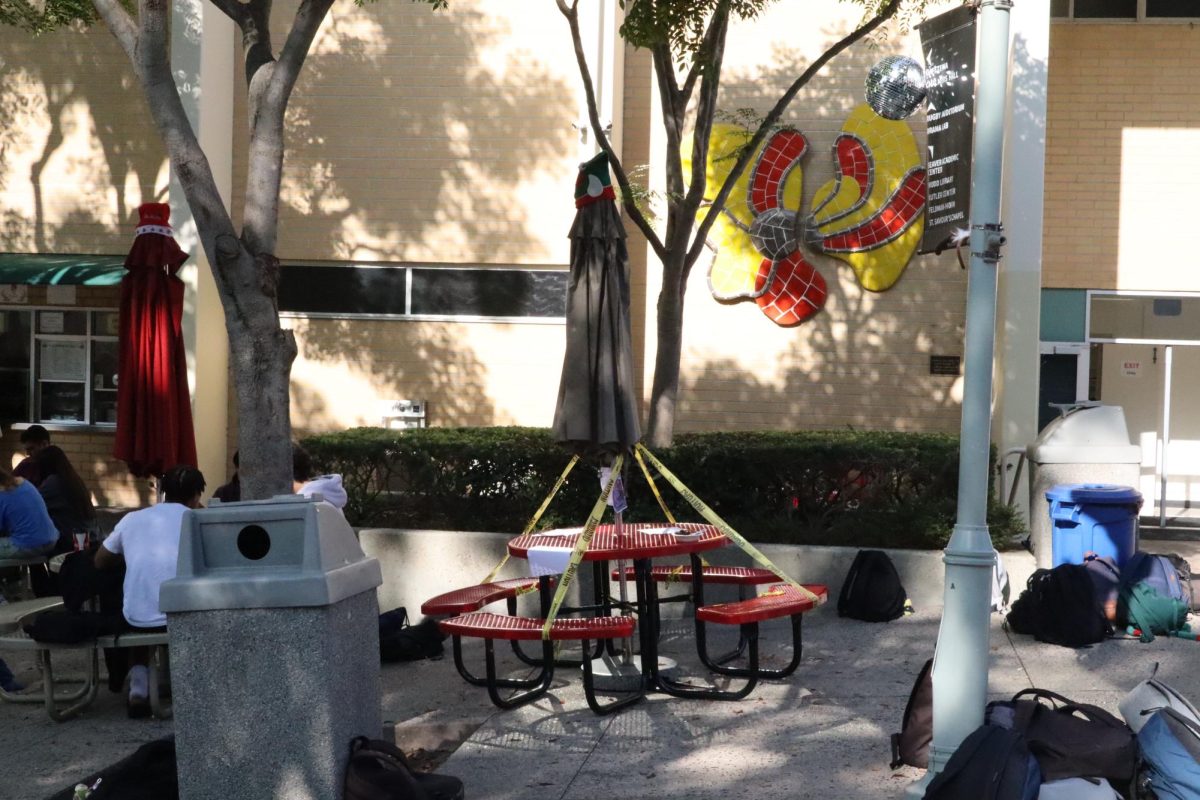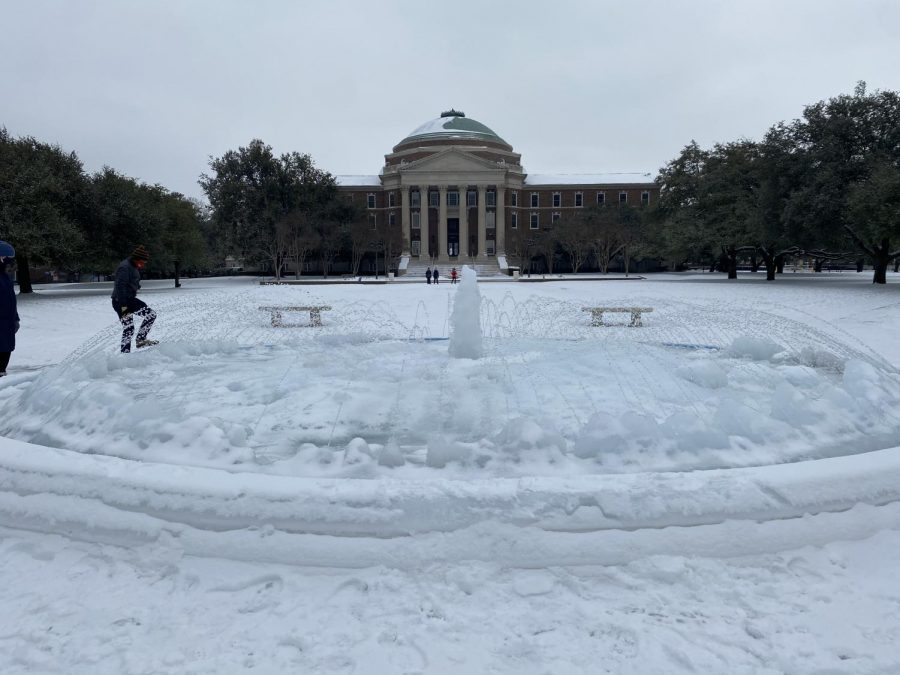Frozen in Time
Students, faculty and alumni who were affected by the recent Texas power outages share their experiences during the crisis.
Used with permission of Max Silver
Max Silver ’20 observes his frozen-over campus at Southern Methodist University during the power outages in February.
March 26, 2021
Waking up to a bright, snowy landscape on Presidents’ Day, Allison Park ’21 was baking brownies and playing outside with her cousin when, suddenly, the house went dark. Upon learning that Texas was facing a statewide power grid failure, her uncooked brownie batter and melting snow creations became the least of her concerns.
“We saw the reports of an incoming snowstorm, but nobody took it seriously,” Park said. “On Sunday, we had snowball fights and made snowmen. The next morning our power went out and didn’t come back on for four days. I’ve never experienced anything like that before. It was shocking and scary because you never knew what would happen next.”
As severe winter storms caused record-breaking low temperatures in early February, Park, along with over four million Texans, endured power outages, food and water shortages and extreme temperatures affecting the state. Icy and unsafe road conditions prevented many from traveling by car, frozen and burst pipes caused floods and many residents were forced to invent ways to access drinkable water, such as melting snow or boiling faucet water. Although the exact death toll is unknown, sources such as The Hill estimate the crisis caused around 70 deaths.
Chloe Zoller ’17, a college senior currently enrolled at The University of Texas at Austin, said despite not being in direct danger, the conditions she faced during the “snowpocalypse,” as she and her classmates coined it, were completely unprecedented.
“Having no food other than what was left in our freezer and no running water was something I never expected, especially in Texas,” Zoller said. “By the third day, panic definitely ensued. Water bottles were nearly out of stock at every market, and we couldn’t get in a car and drive elsewhere. Three of our pipes burst and flooded the building where 500 students live. We were using pool water to flush our toilets and wipes to clean our bodies. We were definitely fortunate, though, for what we did have compared to what other people in Texas were experiencing.”
When Texas Gov. Greg Abbott declared a state of emergency for his state of 29 million people Feb. 12, people were perplexed as to how they experienced an isolated crisis of such a large magnitude, according to eight interviewees from the school community. For over 50 years, the Texas Interconnection power grid, managed by the private agency Electric Reliability Council of Texas (ERCOT), has been outside the regulatory jurisdiction of the federal government. According to the Texas Tribune, ERCOT has come under fire for mismanaging the situation and failing to updating infrastructure to withstand extreme weather. The publication said that many Americans, not only Texans, are angry and demanding answers from the company, sparking multiple investigations run by the state legislature and federal government.
History Teacher Lilas Lane, who has family in three cities across Texas, was not able to connect with her sister who lost both power and water during the crisis. She said that the situation as a whole was frustrating, especially in light of the privatized power system that failed to guarantee basic necessities.
“The way the state handles their electrical system is ridiculous,” Lane said. “I believe in regulation and more nationalization of utilities. To me, it was problematic in the ’80s when they deregulated and privatized all of those public utilities. Everybody should have access to electricity and water. That’s just a basic human right.”
According to the Environmental Protection Agency, the frequency of extreme temperatures continues to grow because of the effects of climate change. After February, it was unclear why the state was unprepared for the winter storm and why the utilities weren’t strong enough to withstand the temperatures. Max Silver ’20, who had to be evacuated from his building at Southern Methodist University after numerous pipe bursts and floods, said he was infuriated by both his school and the state’s ineffective response to the winter storms.
“It was a clusterf*** of idiocracy,” Silver said. “The government wasn’t doing the right thing for the people, [it] was being selfish and it got a lot of people hurt. There were easy ways to get past all that without people getting hurt. There are cold winters everywhere.”
In the state of panic, people looked to their elected officials for procedural and emotional guidance, Chronicle Staff Writer Natasha Speiss ’23, who was in Texas at the time of the power outages, said. However, Speiss said that to the dismay of the people, the Texas power grid failure devolved into a partisan issue when Abbott used the situation as an opportunity to publicly blame renewable energy and denounce the Green New Deal in a series of tweets and interviews with Fox News. Texas Sen. Ted Cruz was also publicly admonished by many liberally-leaning media outlets such as CNN and MSNBC for flying to Cancun, Mexico, while the people whom he represents were stuck in the confines of their dark and freezing homes.
Sadye Lackman ’22, who has multiple grandparents affected by the crisis, said she was disappointed in the priorities of many politicians and the legislature as they handled the state’s crisis.
“It just felt really impersonal,” Lackman said. “Nobody was acknowledging that people were suffering as a result of it, and it seemed like they just needed a problem to blame [the crisis] on. There comes a point where politics are irrelevant and the problem is more pressing than party lines.”
Although power has returned for many, Texas will continue to deal with the repercussions of the storms for months to come due to the billions of dollars in damages. Speiss said that the crisis has not only proven to be pivotal in Texan policy and the discussion of the role of state governments, but also has revealed the threat of climate change.
“I think people in Texas, regardless of party or political views, now distrust their elected officials to do what is best for the citizens,” Speiss said. “Texas can no longer afford to use its own power grid. The state has to join together with other states rather than be its own island. Overall, this event has shown how formidable climate change is as an enemy that we all are facing, not just Texans.”






























